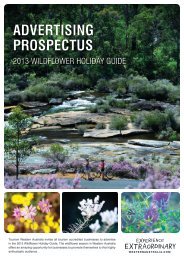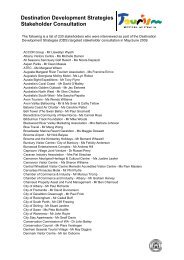A Strategic Approach to the Caravan and Camping Industry 2012
A Strategic Approach to the Caravan and Camping Industry 2012
A Strategic Approach to the Caravan and Camping Industry 2012
You also want an ePaper? Increase the reach of your titles
YUMPU automatically turns print PDFs into web optimized ePapers that Google loves.
An Overflow Policy That Works<br />
Recommendation 7: Develop a State-wide Overflow Policy That Works for Visi<strong>to</strong>rs <strong>and</strong> Supports <strong>Industry</strong><br />
<br />
<br />
Develop a state-wide overflow policy which is consistently enforced for <strong>the</strong><br />
benefit of visi<strong>to</strong>rs <strong>and</strong> <strong>the</strong> support of industry.<br />
Provide a well-developed framework <strong>to</strong> ensure <strong>the</strong> travelling public has an<br />
opportunity <strong>to</strong> stay at <strong>the</strong>ir location of choice, as opposed <strong>to</strong> having <strong>to</strong><br />
bypass a <strong>to</strong>wn or region when <strong>to</strong>urist dem<strong>and</strong> exceeds <strong>the</strong> capacity of local<br />
licensed caravan parks.<br />
Issues <strong>and</strong> Risks<br />
In many remote <strong>and</strong> regional locations, <strong>the</strong>re is often a level of dem<strong>and</strong> during peak<br />
<strong>to</strong>urism periods when <strong>the</strong> capacity of existing commercial caravan <strong>and</strong> <strong>to</strong>urist parks is<br />
at saturation.<br />
An overflow policy will respond <strong>to</strong> concerns raised by visi<strong>to</strong>rs with regard <strong>to</strong> <strong>the</strong> lack of<br />
caravan park capacity during peak <strong>to</strong>urist seasons, <strong>and</strong> avoid conflict with <strong>the</strong> <strong>Caravan</strong><br />
Parks <strong>and</strong> Campgrounds legislation.<br />
The absence of a clear overflow policy can promote illegal camping <strong>and</strong> <strong>the</strong><br />
inappropriate use of community facilities, resulting in a potentially negative outcome<br />
(visual <strong>and</strong> noise pollution, environmental damage <strong>and</strong> maintenance <strong>and</strong> clean-up of<br />
<strong>the</strong> camp sites) for <strong>the</strong> local community.<br />
There are currently potential conflicts of interest where local government regulates<br />
commercial caravan parks <strong>and</strong> also provides (potentially unfair) competition <strong>to</strong> <strong>the</strong>m<br />
through overflow camping facilities.<br />
The risk that <strong>the</strong> overflow facility replaces fully licensed caravan parks is significant<br />
where tariffs are much lower. Potentially a shift in occupancy from licenced caravan<br />
parks <strong>to</strong> overflow facilities could impact on <strong>the</strong> viability of <strong>the</strong> licensed facilities,<br />
leading <strong>to</strong> a reduction in supply.<br />
The <strong>Caravan</strong> <strong>Industry</strong> Western Australia Inc. <strong>and</strong> <strong>the</strong> <strong>Caravan</strong> Parks Association of<br />
Queensl<strong>and</strong> have both produced draft overflow policies which “provide a set of<br />
guidelines for Local Government that assist in <strong>the</strong> promotion of <strong>to</strong>urism” 90 <strong>and</strong> “aid<br />
Local Government <strong>to</strong> establish a pro<strong>to</strong>col of referral between local licenced caravan<br />
parks, <strong>the</strong> Local Authority, <strong>the</strong> relevant Tourist Association, <strong>and</strong> newly arrived visi<strong>to</strong>rs<br />
<strong>to</strong> be directed <strong>to</strong> overflow facilities” 91 . While each of <strong>the</strong> State <strong>Caravan</strong> Parks<br />
Associations’ draft policies have merit, <strong>the</strong>y require complex administration, do not<br />
provide certainty for consumers in booking sites during peak periods <strong>and</strong> are<br />
regarded by <strong>the</strong> caravan <strong>and</strong> camping consumer groups as being biased <strong>to</strong>wards<br />
caravan park opera<strong>to</strong>rs.<br />
Strategy<br />
This strategy draws from both of <strong>the</strong> State <strong>Caravan</strong> Association policies <strong>and</strong> takes in<strong>to</strong><br />
account <strong>the</strong> comments <strong>and</strong> feedback from all sec<strong>to</strong>rs of <strong>the</strong> industry <strong>and</strong> consumers<br />
during <strong>the</strong> consultation.<br />
There are generally two situations where this policy has application, namely, where<br />
communities are serviced by both <strong>the</strong> presence of local caravan parks <strong>and</strong> local<br />
showground, sportsground, <strong>and</strong> community facilities <strong>and</strong> where <strong>to</strong>wns <strong>and</strong><br />
communities are not serviced by <strong>the</strong> presence of a caravan park but have community<br />
facilities suitable for short-term camping.<br />
In <strong>the</strong> first situation, <strong>the</strong> overflow area must be carefully managed <strong>to</strong> avoid unfair<br />
competition with licensed caravan parks, which are required <strong>to</strong> maintain high<br />
st<strong>and</strong>ards of facilities. The proposed Overflow Policy would require that local<br />
government establishes seasonal dem<strong>and</strong> , <strong>the</strong> supply of overflow facilities required<br />
<strong>and</strong> appropriate sites. The sites may include <strong>the</strong> community facilities described above.<br />
For <strong>the</strong> latter example, <strong>the</strong> proposed Overflow Policy would require that local<br />
government identify one or more community facilities suitable for a Transit Camp or<br />
Limited Facility Camp (overflow facility). It would provide a licence <strong>to</strong> <strong>the</strong> overflow<br />
facility opera<strong>to</strong>r <strong>to</strong> operate as a Transit Camp or Limited Facility Camp as appropriate,<br />
ensuring <strong>the</strong> <strong>to</strong>wn could accommodate caravan <strong>and</strong> camping based <strong>to</strong>urists.<br />
Local government would approve <strong>the</strong> opening of an overflow facility for <strong>the</strong> period of<br />
peak seasonal <strong>to</strong>urism dem<strong>and</strong>, subject <strong>to</strong> <strong>the</strong> licensed caravan park being ninety<br />
percent booked or occupied on any one day. Where <strong>the</strong> bookings for all <strong>the</strong> local<br />
caravan parks do not exceed ninety percent, <strong>the</strong> overflow facility must not accept new<br />
90 Use of Local Showgrounds & Community Facilities - Overflow Policy, <strong>Caravan</strong> Parks Assn Queensl<strong>and</strong><br />
91 Template for A Local Government Overflow camping Policy – CIAWA<br />
A <strong>Strategic</strong> <strong>Approach</strong> <strong>to</strong> <strong>Caravan</strong> <strong>and</strong> <strong>Camping</strong> Tourism in Western Australia Page 100



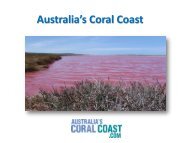
![Annual Report 2002 - 2003 [pdf ] - Tourism Western Australia](https://img.yumpu.com/27124309/1/186x260/annual-report-2002-2003-pdf-tourism-western-australia.jpg?quality=85)
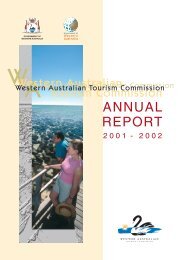
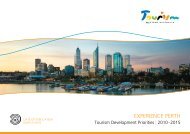
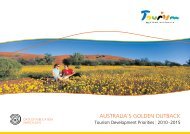
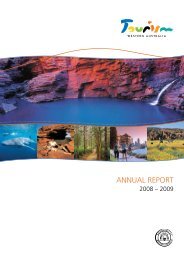

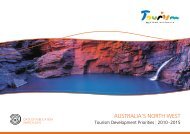
![Our Direction in China 2012 - 2015 [pdf ] - Tourism Western Australia](https://img.yumpu.com/27124271/1/184x260/our-direction-in-china-2012-2015-pdf-tourism-western-australia.jpg?quality=85)
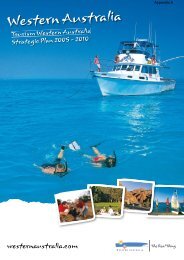

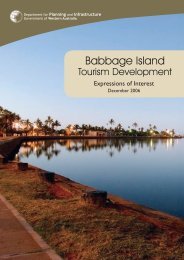
![Naturebank Program 2011 [pdf ] - Tourism Western Australia](https://img.yumpu.com/27124244/1/184x260/naturebank-program-2011-pdf-tourism-western-australia.jpg?quality=85)
